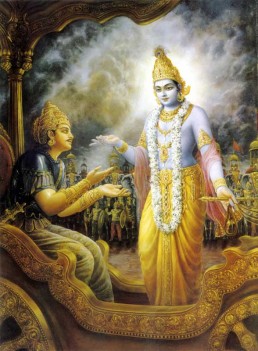Swami Chinmayananda
Swami Chinmayananda Commentary
ALL THIS WORLD IS PERVADED BY ME IN MY UNMANIFESTED FORM — The subtlety of a thing is measured in terms of its pervasiveness and therefore, the Subtlest must necessarily be the All-pervasive. As all limited things must have forms, the All-pervasive alone can be Eternal and Infinite. All forms are perishable substances (Dravya). Thus the Self, in its essential Unmanifest nature, must be pervading everything, as the mud pervades all forms and shapes in all mud-pots.
If thus, the Infinite pervades the finite, what exactly is the relationship between them? Is it that the finite rose from the Infinite? Or is it that the Infinite PRODUCED the finite? Has the Infinite Itself become the finite, as a modification of Itself, or do they both, among themselves, keep a father-son, or a master-servant relationship? Various religions of the world abound in such questions. The dualists can afford to indulge in such a fancied picture of some relation or other between the finite and the Infinite. But the Adwaitins (Non-dualists) cannot accept this idea, since to them the Eternal Self alone is the ONE and the ONLY REALITY.
The second line of this stanza is a classical description of this “relationless-relationship” between the Real and unreal. “All beings exist in Me but I dwell not in them.” To a hasty reader this would strike as an incomprehensible paradox expressed in a jumble of empty words. But to one who has understood well the theory of super-imposition, this is very simple. The ghost-vision can come only upon the post. And what exactly is the relationship between the ghost and the post from the standpoint of the post? The innocent post, in infinite love for the deluded fool, can only make a similar statement as the Lord has made here. “The ghost,” the post would say, “is no doubt, in me, but I am not in the ghost; and therefore, I have never frightened any deluded traveller at any time.” In the same fashion the Lord says here, “I, IN MY UNMANIFEST NATURE, AM THE SUBSTRATUM FOR ALL THE MANIFESTED” chaos of names and forms, but neither in their joys nor in their sorrows, neither in their births nor in their deaths, “AM I SHARING THEIR DESTINIES, BECAUSE I DO NOT DWELL IN THEM.”
This line sounds a faithful echo of the same idea, perhaps more crisply expressed earlier (VII-12), where it was said “I AM NOT IN THEM, THEY ARE IN ME.” In short, it is indicated here that the Self which, through Its identification with the matter-envelopments, has come to “DWELL IN THEM,” is the pain-ridden mortal, while the same Self which has successfully withdrawn all Its false arrogations with the matter layers and has come to realise that, “I DO NOT DWELL IN THEM” is the Self, Immortal and Unmanifest.
THEN THERE MUST BE SOME SORT OF AN EXISTENCE FOR THE FINITE IN THE INFINITE:
Adi Sankara Commentary
Idam, this; sarvam, whole; jagat, world; is tatam, pervaded; maya, by Me; through the supreme nature, that I have, avyakta-murtina, in My unmanifest form, in that form in which My nature is not manifest, i.e. in My form which is beyond the range of the organs. Sarva-bhutani, all beings, from Brahma to a clump of grass; matsthani, exist in Me, are established in Me in that unmanifest form. For, no created thing that is bereft of the Self (i.e. of Reality) can be conceived of as an object of practical use. Therefore, being possessed of their reality through Me who am their Self, they exist in Me. Hence they are said to be established in Me. I Myself am the Self of those created things. Consequently, it appears to people of little understanding that I dwell in them. Hence I say: Na ca aham, but I am not; avasthitah, contained; tesu, in them, in the created things. Since unlike gross objects I am not in contact with anything, therefore I am certainly the inmost core even of space. For, a thing that has no contact with anything cannot exist like something contained in a receptacle. For this very reason that I am not in contact with anyting-
The Bhagavad Gita with the commentary of Sri Sankaracharya – Translated by Alladi Mahadeva Sastry
Holy Geeta – Commentary by Swami Chinmayananda
The Bhagavad Gita by Eknath Easwaran – Best selling translation of the Bhagavad Gita
The Bhagavad Gita – Translation and Commentary by Swami Sivananda
Bhagavad Gita – Translation and Commentary by Bhaktivedanta Swami Prabupadha
Srimad Bhagavad Gita Chapter 9 – Verse 4 – 9.4 maya tatamidam – All Bhagavad Gita (Geeta) Verses in Sanskrit, English, Transliteration, Word Meaning, Translation, Audio, Shankara Bhashya, Adi Sankaracharya Commentary and Links to Videos by Swami Chinmayananda and others – 9-4

